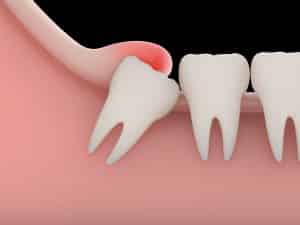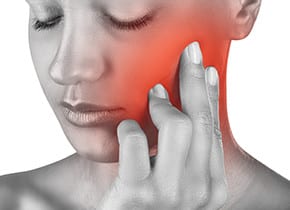What are wisdom teeth?
Your wisdom teeth are the third and last molars on the left and right sides of your upper and lower jaw. They are also the last teeth to erupt into the mouth and normally appear in one’s late teens to early twenties.
How do I know if I have wisdom teeth?
Not everyone develops wisdom teeth, and there is nothing to worry about if you don’t have any.
The easiest way to be sure is to see a dentist; a routine examination will often identify any wisdom teeth.

Do they need to be extracted?
Because wisdom teeth are the last teeth to erupt into the jaw, they often struggle for space and this can cause them to become impacted, or remain below the gum line. When wisdom teeth are impacted, they can cause infection or decay in the teeth next to them.
Give our friendly reception team at Smile Solutions a call on 13 13 96. They will then arrange a consultation with one of our highly trained clinicians to assess you for wisdom teeth extraction.
What do I do if I think I have a impacted wisdom tooth?
A tooth that has only partially erupted or has come through at a crooked angle is known “impacted”. The gum around the impacted tooth may become swollen, painful or (in some cases) infected, which can cause considerable pain.
While waiting to see a dentist, you should keep the area around the wisdom tooth as clean as possible with good oral hygiene.
If infection is present, you may be given a local anaesthetic (dental injection) to numb the area around the tooth and relieve any pain. The area will be thoroughly cleaned and sterilised with an antibacterial solution. A prescription of antibiotics analgesics (pain killers) may also be given in severe cases.

Depending on the degree of impaction and your personal preference, extractions can also be carried out under local anaesthetic in the dental chair or under general anaesthesia in a hospital administered by a specialist anaethetist. These options will both be discussed at your initial consultation.
If you experience any of the above symptoms, call our friendly reception team at Smile Solutions. We are open seven days a week, and if you are in pain we will always aim to arrange a same-day appointment for you.
Do I need to see a specialist for wisdom tooth removal?
Wisdom teeth can erupt in lots of different positions, with differing levels of complexity associated with their removal. They can even be buried deep in the jawbone or in close proximity to facial structures such as nerves or sinuses.
While many removal procedures can be carried out by a general dentist, in more complex cases a specialist oral & maxillofacial surgeon will become involved so as to make the process as effective and risk free as possible. All of these practitioners can be seen at our single Melbourne CBD location.
What does the procedure for wisdom tooth removal involve?
At your first visit a clinical assessment of your wisdom teeth will be carried out. Normally a specialised X-ray called an OPG, or in more complex cases a three-dimensional scan called a CBCT, is arranged. This will give your clinician a better indication of where your wisdom teeth are placed in your jaw, and she or he will then be able to give you a clear picture of what to expect during and after extraction. The options for how the wisdom teeth are removed will be discussed in detail and of course your personal preferences will be taken into account.
Removal under local anaesthetic
Removal of the tooth/teeth can in many cases be carried out under local anaesthesia (the same as the anaesthesia used for a filling).
You’ll be awake and aware of everything happening around you, but the area the Oral and Maxillofacial Surgeon works with will be completely numb. You may still feel pressure placed around the area.
The procedure will take place in the dental chair, in the dental clinic. The local anaesthetic will be administered by a Smile Solutions specialist anaesthetist and you will be monitored by them throughout the procedure.
Removal under general anaesthetic
The removal of your wisdom tooth will take place in hospital, under surgical conditions. You will be given a choice of hospital and be admitted to day surgery. During your admittance you will receive all the care and procedure of a usual hospital visit.
A specialist anaesthetist will carry out the administration of general anaesthetic and you will be constantly monitored throughout your procedure. Your Oral and Maxillofacial Surgeon will perform the removal surgery. After the administration of anaesthetic, you will have no recollection of the procedure.
Everyone who has their wisdom teeth removed has a different preference, and it’s up to you, in discussion with your Oral and Maxilliofacial Surgeon to decide.
It’s important to take into account the difficulty of the extraction, what you’re comfortable with, treatment costs, and your level of private health insurance.
What should I expect when my wisdom teeth are removed?
A small amount of bleeding, some discomfort and a little bruising are all normal after wisdom tooth removal. However, in most patients all of these resolve quickly.
- Pain
Wisdom tooth removal involves minor oral surgery. Depending on the complexity of your surgery, the amount of pain you experience will vary.
- Swelling
Swelling can occur due to the trauma caused to the tissues around each tooth that’s being removed. Anti-inflammatory medication and ice/heat packs can help manage this in the days following your procedure.
- Bruising
The normal amount of bruising can be expected to develop two to three days after the procedure.
How long is the recovery time after wisdom tooth extraction?
A small amount of bleeding, some discomfort and a little bruising are all normal after wisdom teeth removal, but most patients recover fully from all of these.
Recovery time really depends on the complexity of your case. If you have one simple upper wisdom tooth removed, you should be back to normal the next day. If, on the other hand, all four of your wisdom teeth are impacted and need to extracted in hospital, your recovery time can be up to a week.

The team at Smile Solutions will give you clear instructions on the day as to how to look after yourself following surgery, and we are always on hand for any post-operative care if you have any problems.
Generally your dentist or surgeon will arrange a follow-up appointment with you to check that you are healing well.
What aftercare is needed?
At Smile Solutions, your practitioner will give you a post-operative pack when you have had your surgery. This will include written instructions on what to do, a medical certificate if required, additional gauzes for any post-operative bleeding, and a mouthwash and syringe for keeping the surgery site clean.
We also give you our after-hours emergency number for your peace of mind. Pain relief and antibiotics, if needed, will also be prescribed.
What to avoid
- Avoid smoking for at least 72 hours but longer if possible.
- Don’t drink through a straw
- Avoid drinking alcohol.
- Avoid blowing your nose.
- Avoid excessive spitting or rinsing.
- Don’t drink hot soup or other hot liquids.
- Avoid physical exertion for 24 hours.
Any of the above behaviours, if not avoided, can disturb the healing clot and this can cause what we call a dry socket. A dry socket can cause a throbbing pain at the site of the wisdom tooth removal, usually about 48 to 72 hours after the procedure. If you suspect you may have developed a dry socket you should contact your dentist immediately for treatment.
At Smile Solutions we will provide you with the best possible care before, during and after your wisdom tooth removal. If you have any questions please give our friendly team a call on 13 13 96.
